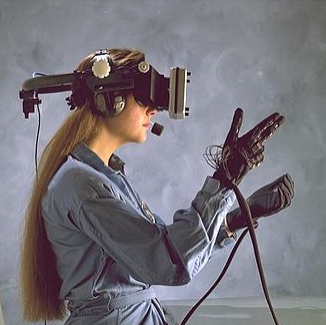
While Miley Cyrus might seem like the harbinger of Dark Days to come, it's the spectacled egg-heads we've got to keep an eye on. While Google Glass has by and large been poo-pooed by tech-heads and tech-phobes alike—as it's both embarrassing to wear and too anti-social even for the anti-social—there has been a new push for reality-enhancing devices that seem dangerously close to delivering us to dystopia.
Sony recently announced that they're building a virtual reality headset, Project Morpheus—the Matrix echo is palpably disconcerting—which will enable gamers to plunge headlong into 360-degree virtual worlds. And this comes hot on the heels of Facebook snatching up Oculus Rift—yup, another virtual reality gaming headset—for a cool $2 billion on Tuesday.
For those people—and there's throngs of them around the world—the dawn of VR has been a painful, panting, 20-year wait; the first incarnations of the VR first emerged in the 90s and were complete flops. These are the first whispers of truly "immersive" systems poised to fundamentally change the way we interact with technology, each other and reality as we know it.
Sure, it sounds easy to relegate these systems to owl-eyed gamers half-starved on old pizza in their moms' basements, but Sony, Facebook and Google have set their sights on horizons far beyond pasty-faced man-children.
Zuckerberg says that Facebook is gearing up for "the platform of tomorrow" where humanity "can share unbounded spaces." He explained:
Imagine enjoying a court-side seat at a game, studying in a classroom of students and teachers all over the world or consulting with a doctor face-to-face—just by putting on goggles in your home.
And while the possibilities seem tantalizing—imagine a world where physical boundaries cease to have meaning or consequence: with a click of a button you could step into anyone's body, mind, country or fantasy—they're also a bit chilling. In a world where video games have already compromised our ability to disassociate from the violence they proffer and the ubiquitous presence of the digital realm has undermined our real-time, face-to-face connectivity, a virtual playpen could come at a high cost.
It's hard to deny that Zuckerberg's vision of a real-life Metaverse—conceived already in prophetic science fiction novels like Neuromancer, Snow Crash and Otherland—isn't something to celebrate. The question is whether a virtual universe creates more problems than possibility. Or maybe we're just overly steeped in the cyberpunk, cyborg, "synchronicity" fear perpetuated by paranoid and depressive writers chronicling an inevitably dystopian future? Certainly the darker shit sells like hot cakes; our recent obsession with The Hunger Games—a novel that explores fascism, sadism and child torture—reveals what we're into.
And remember Second Life? Surprise surprise, Second Life founder Philip Rosedale has been clandestinely building a virtual reality start-up—High Fidelity—and just openly raised $2.5 billion to get the ball rolling.
These advances are coming fast and carry with them complicated questions: will VR improve our daily lives, enabling a crippled child to experience the joy of running through a field or giving nursing home patients the chance to see African gazelles galloping across the Serengeti—or are we tampering with our true existence and thus, our human-ness? If people prefer living online because life is better/easier/more exciting there . . . should we let them? Is this the beginning of a cyborg generation? These devices aren't implanted in our brains yet, but they will provide a new landscape of reality, essentially making us—at least—half machine.
It's a brave new world indeed.





